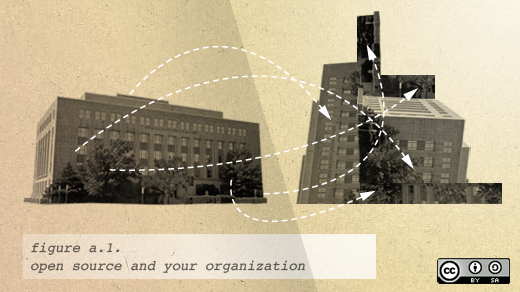On occasion I get the opportunity to speak publicly about some of the things I've learned over the years applying the open source way in organizations.
In almost every case, when the Q&A session arrives, I'm greeted with at least one question from a poor soul who loves the idea of applying the open source way to management and culture, but doesn't think it would ever work in his/her specific organization. Usually the comment is accompanied by some horror story about an evil co-worker, hierarchical boss, crappy HR policy, or some other impediment that would cause the open source way to fail.
And the sad truth? These folks are probably right. Many of these concepts wouldn't work in their organizations.
So why do I waste my time talking about things that may not work in many organizations? Two reasons:
1) hope
2) the wind
Hope
Let me be honest. I've never run into a perfect model of the open source way in practice (if you have, please point it out to me!).
There are clearly some organizations that have figured out how to build open source principles into their DNA better than others. Wikipedia is a good example. The Fedora Project is another. Still, my guess is the people who are deeply involved in those projects on a daily basis would probably be able to show you some warts, places where old-skool practices are still evident.
We've set our company New Kind up as a corporate lab for the open source way. But we can't make a case for perfection here either. We are still learning and prototyping.
So why not be more realistic? Why not give up and accept that some of these principles work better in theory than they do in practice?
Simple: I have hope.
What gives me hope? Two things. First, I have seen first-hand many examples of great things that happen when open source principles are applied within organizations. From the collaboratively-designed mission of Red Hat to the work of Fedora marketing team, I've personally witnessed the power of open source principles in action.
Second, I believe in the pursuit of perfection. Why not aspire to create better companies than we have today? What do we have to lose? I don't know that we will ever see a perfect open source company. But by pursuing perfection, we are likely to get a heck of a lot closer than where we are today.
The wind
Watch out when I start quoting Bob Dylan, but we've all heard the lyric from Subterranean Homesick Blues:
"You don't need a weather man to know which way the wind blows."
The other reason I love talking about applying open source principles within organizations is because I'm pretty confident which way the wind is blowing.
I think Gary Hamel knows too. In fact, he wrote a nice post on opensource.com last week describing in detail some of the characteristics that the next-generation workforce will be looking for in the companies where they spend their days. From the article:
The experience of growing up online will profoundly shape the workplace expectations of “Generation F” – the Facebook Generation. At a minimum, they’ll expect the social environment of work to reflect the social context of the web, rather than as is currently the case, a mid-20th-century Weberian bureaucracy.
Well said. Each year, as more and more folks enter the workforce who grew up with the transparency, access, collaboration, openness, and level playing field of the Internet, we will see more and more workers rebel against the status quo.
Most likely, these new employees will rebel with their feet. They'll join a new breed of organization designed from scratch, like Red Hat, Google, and 100s of other yet unknown companies, built from the ground up to operate efficiently in an open world.
Old-skool companies will have a tough time attracting the best young talent. And if they are losing the race for top talent, they be hard pressed to stay competitive.
So this is why I love to talk about applying the open source way in organizations, even when I know that many of today's corporate cultures would chew open source principles up and spit them out.
I'm just running with the wind.






8 Comments